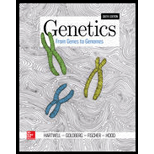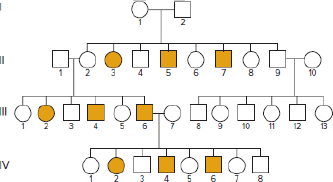
Genetics: From Genes to Genomes
6th Edition
ISBN: 9781259700903
Author: Leland Hartwell Dr., Michael L. Goldberg Professor Dr., Janice Fischer, Leroy Hood Dr.
Publisher: McGraw-Hill Education
expand_more
expand_more
format_list_bulleted
Textbook Question
Chapter 20, Problem 6P
You have decided to study genetic factors associated with colon cancer. An extended family from Morocco in which the disease presents itself in a large percentage of family members at a very early age has come to your attention. (The pedigree is shown in the accompanying diagram.) In this family, individuals either get colon cancer before the age of 16, or they don’t get it at all.

| a. | Based on the information you have been given, what evidence, if any, suggests an inherited contribution to the development of this disease? |
| b. | You decide to take a medical history of all of the 33 people indicated in the pedigree and discover that a very large percentage drink a special coffee on a daily basis, while the others do not. The only ones who don’t drink the coffee are individuals numbered I-1, II 2, II-4, II-9, III-7, III-13, IV-1, and IV-3. Could the drinking of this special coffee possibly play a role in colon cancer? Explain your answer. |
Expert Solution & Answer
Want to see the full answer?
Check out a sample textbook solution
Students have asked these similar questions
Melanoma, 45
Colon cancer, 40
Sarcoma, 45
Breast
Lung cancer, 53
cancer, 32
Stomach
cancer, 50
Brain cancer, 18
Osteosarcoma, 3
Leukemia, 19
Rhabdomyosarcoma, 14
Answer the following subparts :-
A. What do you notice in this pedigree as compared to Rb or BRCA1/2?
B. Why do you think that so many cancer types are associated with inherited defects in
p53?
Please need detailed answer I want to learn please please I will upvote god promise|
Suppose that you could undergo genetic testing at age 18 for susceptibility to a genetic disease that would not appear until middle age and has no available treatment. a. What would be some of the possible reasons for having such a genetic test and some of the possible reasons for not having the test? b. Would you personally want to be tested? Explain your reasoning.
The pedigree pictured is of an extended family where a large percentage of family members develop colon cancer at an early age. In this family, individuals either get colon cancer before the age of 16, or they don’t get it at all.
a) Based on the information you have been given, what evidence, if any, suggests an inherited contribution to the development of this disease?
b) You take a medical history of all 33 people in the pedigree and discover that a large percentage drink a special coffee on a daily basis, while others do not. The individuals who do not drink coffee are I-1, II-2, II-4, II-9, III-7, III-13, IV-1, and IV-3. Could drinking this special coffee play a role in colon cancer? Explain.
Chapter 20 Solutions
Genetics: From Genes to Genomes
Ch. 20 - For each of the terms in the left column, choose...Ch. 20 - Characterize the differences between tumor cells...Ch. 20 - Prob. 3PCh. 20 - Prob. 4PCh. 20 - A carcinogenic compound is placed on the skin of...Ch. 20 - You have decided to study genetic factors...Ch. 20 - B cells are specialized blood cells that secrete...Ch. 20 - Molecules outside and inside the cell regulate the...Ch. 20 - Put the following steps in the correct ordered...Ch. 20 - a. Would you expect a cell to continue or to stop...
Ch. 20 - Two different protein complexes called SCF and APC...Ch. 20 - One of the hallmarks of mitotic anaphase is the...Ch. 20 - Concerning the Tools of Genetics Box Analysis of...Ch. 20 - Are genome and karyotype instabilities...Ch. 20 - Prob. 15PCh. 20 - Why dont all loss-of-function mutations that are...Ch. 20 - Chromothripsis is a rare phenomenon, first...Ch. 20 - The chromosome 9/22 translocation associated with...Ch. 20 - A female patient 19 years old, whose symptoms are...Ch. 20 - Prob. 20PCh. 20 - A generic signaling cascade is shown in the...Ch. 20 - Neurofibromatosis type 1 NF1; also known as von...Ch. 20 - Families with germ-line BRCA1 or BRCA2...Ch. 20 - The text explained that retroviruses can cause...Ch. 20 - Hepatocellular carcinoma is the most frequent form...Ch. 20 - Suppose that instead of microarrays, you analyzed...Ch. 20 - Prob. 27PCh. 20 - Glioblastoma multiforme GBM is the most common and...Ch. 20 - a. The legend to Fig. 20.29 identifies which of...Ch. 20 - The website CBioPortal http://www.cbioportal.org...
Knowledge Booster
Learn more about
Need a deep-dive on the concept behind this application? Look no further. Learn more about this topic, biology and related others by exploring similar questions and additional content below.Similar questions
- a. On the basis of this pedigree, what is the most likely mode of inheritance for the disease? Explain your reasoning. b. Based your answer to part a, give the most likely genotypes for all family members in the pedigree.arrow_forwardPancreatic cancer is clearly inherited as an autosomal dominant trait in the family illustrated in Figure 23.1. Yet most cases of pancreatic cancer are sporadic, appearing as isolated cases in families with no obvious inheritance. How can a trait be strongly inherited in one family and not inherited in another?arrow_forwardGenetic tests that detect mutations in the BRCA1 and BRCA2 oncogenes are widely available. These tests reveal a number of mutations in these genes—mutations that have been linked to familial breast cancer. Assume that a young woman in a suspected breast cancer family takes the BRCA1 and BRCA2 genetic tests and receives negative results. That is, she does not test positive for the mutant alleles of BRCA1 or BRCA2. Can she consider herself free of risk for breast cancer?arrow_forward
- d)To cause cancer, proto-oncogenes require (1 or 2)allele(s) to be mutated and therefore are considered (dominant or recessive). The mutation results in a (loss or gain) of function. For each underlined pair, boldface one. e)To cause cancer, tumor suppressor genes require (1 or 2)allele(s) to be mutated and therefore are considered (dominant or recessive). The mutation results in a (loss or gain) of function. For each underlined pair, boldface one.arrow_forwardThe propensity to develop retinal cancer can run in pedigrees of certain families. You have learned about the role of the retinoblastoma (Rb) protein in the cell cycle. A heterozygous individual (genotype = Rbm / Rb+) that inherits a mutant allele of the Rb gene (Rbm) as well as a normal allele of the Rb gene (Rb+) is at significant risk for developing cancer of the retina. The best explanation for this is that… A. the Rb(m) allele is dominant to the Rb(+) allele. B. a mutation in the Rb(+) allele can result in a Rb(m) / Rb(m) genotype in certain cells. C. the retina is frequently exposed to UV rays D. the Rb(m) allele directly converts the Rb(+) allele to another Rb(m) allele. E. the cells of the retina carry more than two copies of the Rb genearrow_forwardA. Look at the pedigree, and DISREGARD individual II-8 for the moment. Is the pattern of inheritance of Unetan syndrome dominant or recessive? You may assume that the gene is FULLY-PENETRANT in this family. Please give two specific reasons that support your conclusion. B. Now, looking at BOTH the pedigree AND at the Southern blot, is this trait autosomal, X-linked, or Y-linked? Please give two specific reasons that support your conclusion. Once again, disregard II-8 for the moment. One of your two reasons must refer specifically to evidence present in the Southern blot. C. Define the gene alleles associated with Unetan syndrome. Your alleles MUST be consistent with the pattern of inheritance, AND your genetic notation must be consistent with that used throughout the course. Unetan syndrome allele: ________ Normal allele: ________arrow_forward
- Mutations in the HPRT1 gene in humans result in atleast two clinical syndromes. Consult OMIM (www.omim.org) by querying HPRT1; you will only needto look briefly at the top three hits (files #300322,300323, and 308000).a. What is the full name of the HPRT1 enzyme?b. On which chromosome is the HPRT1 gene located?c. Mutations in HPRT1 are associated with two different syndromes. What are these syndromes? Foreach, answer the following questions: (i) What arethe symptoms associated with the syndrome? (ii) Isthe mutant allele that causes the syndrome dominant, recessive, codominant, or incompletely dominant with respect to the normal allele, or do specialconditions apply? (iii) Is the syndrome associatedwith a loss-of-function or a gain-of-function disease allele? (iv) Does the syndrome display allelicheterogeneity? (v) Does the syndrome display locus heterogeneity? (Note: You do not need to understand everything in the OMIM entries to answerthese questions.)arrow_forwardIn man, muscular dystrophy is a condition in which the muscles waste away during early life and may result in a shorter life expectancy. It is due to a sex-linked, recessive gene. A certain couple has five children – three boys (ages 1yr, 3yrs, and 10yrs old) and two girls (ages 5yrs and 7yrs old). The oldest boy shows the symptoms of this disease. You are their family physician and they come to you for advice. What would you tell them about the chances of their other children developing the disease?arrow_forwardTalk about the challenges involved in determining the genetic components of polygenic illnesses. Explain complementation groups and how the biochemical underpinnings of disease are determined using them. Hereditary illnesses of genomic instability include Werner syndrome, Bloom syndrome, XP, ataxia-telangiectasia, and Fanconi anemia. Which of these ailments has molecular mechanisms behind it? Which kind of genetic instability is connected to which disorder?.arrow_forward
- Based on the figure below: If children with hereditary retinoblastoma often survive until adulthood and produce children, what is their risk of developing other types of tumors later in life? What is a risk for their children of developing retinoblastoma? Is there the tendency to develop retinoblastoma inherited as a dominant trait or as a recessive trait? Is there one mutant copy sufficient to predispose a person to develop the cancer or two copies are needed to develop retinoblastoma as a cancer?arrow_forwardWe often speak of diseases such as phenylketonuria (PKU) andachondroplasia as having a genetic basis. Explain whether the followingstatements are accurate with regard to the genetic basis ofany human disease (not just PKU and achondroplasia).A. An individual must inherit two copies of a mutant allele to havedisease symptoms.B. A genetic predisposition means that an individual has inheritedone or more alleles that make it more likely that she or he willdevelop disease symptoms than other individuals in a populationwill.C. A genetic predisposition to develop a disease may be passedfrom parents to offspring.D. The genetic basis for a disease is always more important thanthe environment.arrow_forwardNow assume that the pedigree shown in question 1 shows the inheritance of a rare genetic disease. a) The disease is most likely autosomal dominant b) The disease is most likely autosomal recessive c) The disease is equally likely to be either autosomal dominant or autosomal recessive, but cannot be x-linked d) Cannot be determined from the information givenarrow_forward
arrow_back_ios
SEE MORE QUESTIONS
arrow_forward_ios
Recommended textbooks for you
 Human Heredity: Principles and Issues (MindTap Co...BiologyISBN:9781305251052Author:Michael CummingsPublisher:Cengage Learning
Human Heredity: Principles and Issues (MindTap Co...BiologyISBN:9781305251052Author:Michael CummingsPublisher:Cengage Learning

Human Heredity: Principles and Issues (MindTap Co...
Biology
ISBN:9781305251052
Author:Michael Cummings
Publisher:Cengage Learning
What are Mutations and what are the different types of Mutations?; Author: Science ABC;https://www.youtube.com/watch?v=I16YlE8qTBU;License: Standard youtube license